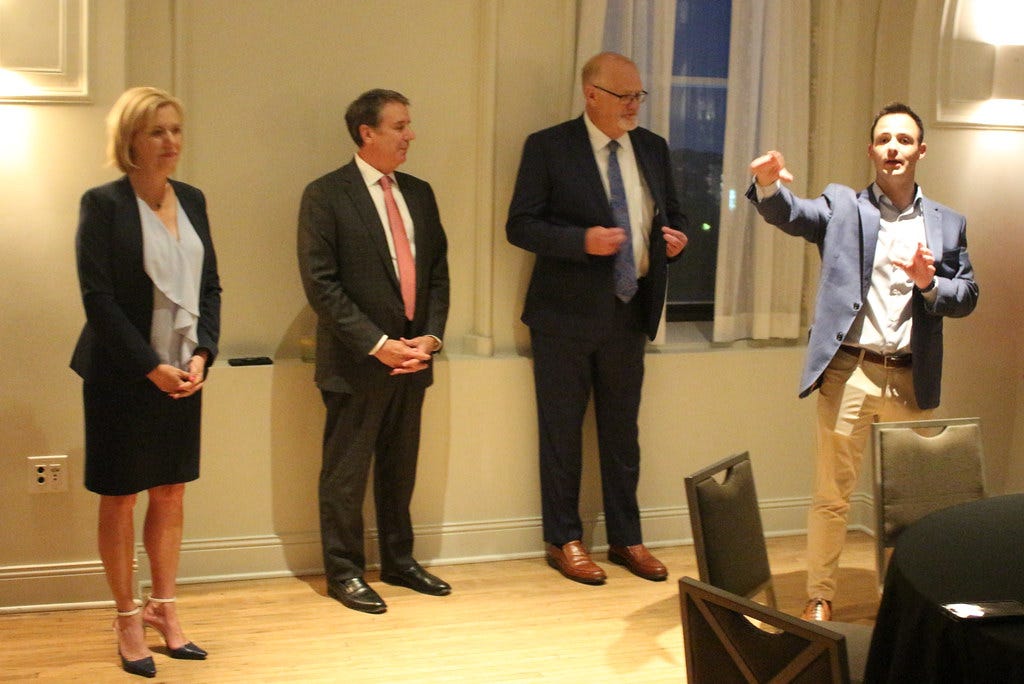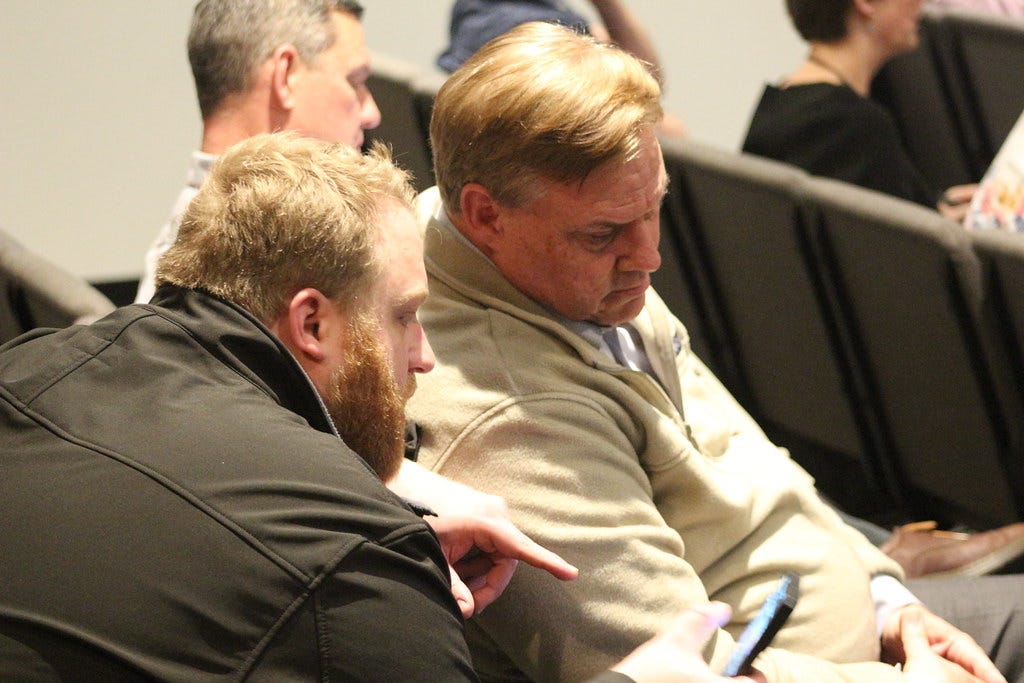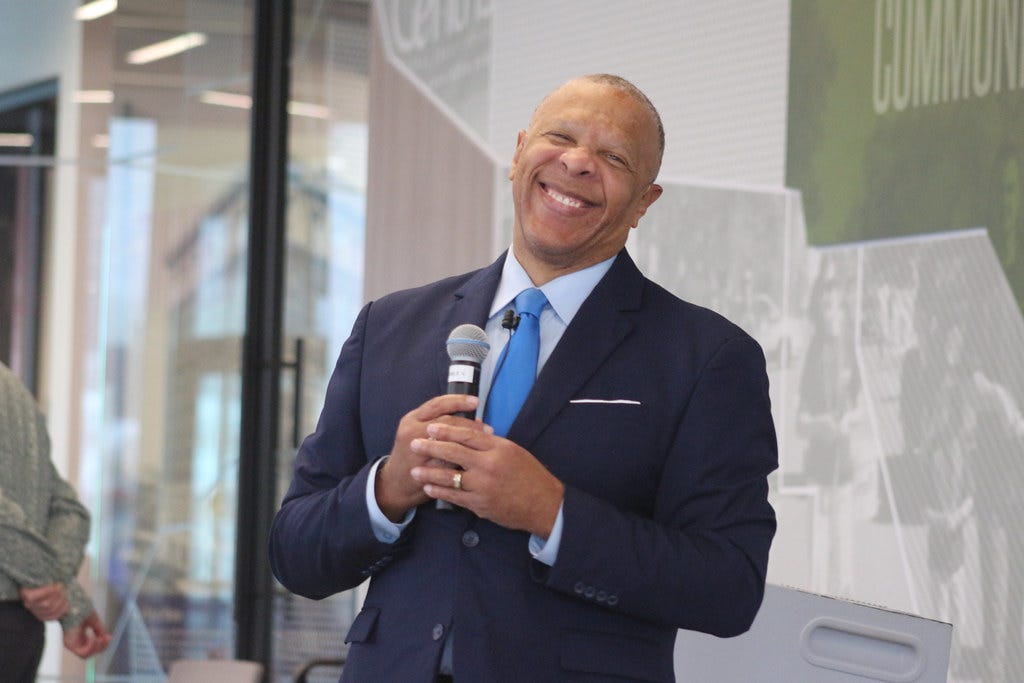What Went Wrong with the Stothert Campaign?
It was a beautiful, cool evening when I attended an Inauguration Reception for the newly-reelected Republican members of the Omaha City Council, Aimee Melton, Brinker Harding, and Don Rowe. The event was hosted by Derek Oden and Matthew Zacher, co-founders of Flyover Strategies, which ran the campaigns of the three city council members, and it was held in the rooftop ballroom of the Blackstone Hotel (now the Kimpton Cottonwood Hotel).
I chatted with the Mayor of Gretna about the origin of the Reuben sandwich, which had been invented there a century earlier. A red velvet cake with white icing came out to celebrate the 50th birthday of Theresa Thibodeau, the sister of Melton and director of outreach for Congressman Don Bacon.
Despite the festivity, the occasion was bittersweet due to the absence of one person — Omaha’s now former-Mayor Jean Stothert. Her successor John Ewing Jr. had just been inaugurated hours earlier, and the topic of discussion among several guests was palpable — what went wrong with the Stothert campaign?
Questions about Turnout
A few months earlier, Council member Harding had advanced a theory that the Democrats in Douglas County had left his and Rowe’s seats deliberately unchallenged as a way to suppress turnout in West Omaha. He still held to this theory as I chatted with him at the reception. State Senator Robert Clements, speaking at a recent Cass County GOP meeting, also believed this to be the case.
Kyle Clark, a political consultant with Chase Marketing, told me that he learned of this plan in the fall of 2024 and alerted the Douglas County Republican Party.
“They thought it was a wonderful thing that Councilmen Harding and Rowe were unopposed … one party leader told me I was ‘trying to create problems where none existed,’” Clark said. “Obviously, removing challengers in the three City Council districts where Republicans win reduces Republican turnout in the vote for Mayor. This is a strategy Democrats employ across the country, often to great success.”
Derek Oden, who I spoke with after the rooftop gala, was skeptical. “Turnout was more or less the same. In fact, Brinker Harding ran unopposed, and his district, Ward 6, had a larger turnout than any other — 39%.”
Stephen Bader, who worked on the McDonnell campaign, also disagreed, noting that Sara Kohen was approached to run against Aimee Melton, and others were considered for campaigns against Rowe and Harding. Ultimately, none of these candidates pursued the races.
”There doesn’t need to be a conspiracy where failure to close is the actual explanation for the Democrats,” Bader said. Whatever the effects the Democrats’ plan had on voter turnout, it doesn’t explain the massive swing of over 22,000 votes away from Jean Stothert from 2021 to 2025.

The Streetcar Project and Messaging Missteps
One major issue for the Stothert campaign was the streetcar project. Clark noted polling that said two-thirds of likely voters opposed it. And while Oden acknowledged this problem, he saw the streetcar project as widely misunderstood. Oden believes Omaha will see the benefits of the streetcar in the coming years, similar to the West Omaha Expressway, which was developed under former Mayor Hal Daub and also unpopular at the time.
“Twenty years from now, people will say ‘wow this was something that was needed and drove all this growth,’” Oden said. “I commended her for doing it, and I think they should have gotten ahead of that issue over the last year.”
There were also missteps in Stothert’s campaign management. Running a campaign in a city that leans left is going to be very different from one run statewide in a Republican state.
“She never should have injected herself into presidential politics,” Oden said. “And she did, by supporting Winner Take All. It fired up the blue dot, and the Ewing campaign tapped into that.”
Oden also saw the last-minute effort to bring up transgender issues as a significant misstep. “Running the ads they did, changing their ads at the end, running an ad on the transgender issue, you can’t win in a city with more Democrats than Republicans.”
Outside groups heavily supported the Ewing campaign with similar tactics, but unlike the Stothert campaign, their tactics worked.
“One thing Democrats and their outside groups are good at is injecting emotionally-charged social issues into a race,” Bader said. “And Women Who Run and Planned Parenthood played an active role in the primary and the general, talking about abortion, even though it has nothing to do with the role of mayor. This was the same tactic used in 2022 to save Deb Neary in her State Board of Education race — distract from low test scores, and get people to vote on behalf of ‘women’s rights.’”
Voter Fatigue and the Shelf Life for Leadership
Another recurring issue was that Stothert had simply been mayor for too long. As former Mayor PJ Morgan said, when introducing McDonnell at the Pachyderm luncheon the day before the primary, “Thanks, Mayor, for your service the last 12 years, but it’s time for a change.”
“Voter fatigue is real, and I heard it when I said I was going to run for a fourth term,” Stothert said in a post-election KFAB interview. “I’ve heard people say, ‘Well, isn’t three enough?’ And so, you know, three [terms] was a lot too. I had it in me. I sure had it in me to do four more years.”
In an interview on KFAB, former Mayor Hal Daub compared it to barnacles attaching to the hull of a ship over time. “There’s an agitation that occurs over a tree being cut down, or a pothole not being filled, or a streetcar issue … and after a while, those barnacles weigh that ship down.” Tony Connor, the former OPOA President who endorsed McDonnell, was more blunt. “The longer someone stays in leadership, they develop blind spots they don’t realize are there. And when ego prevents them from taking advice, those blind spots turn into liabilities.”
Voter fatigue did not seem to be a problem for John Ewing, however, who has been in elected office as Douglas County Treasurer much longer than Stothert — 18 years. One guest at the Pachyderm Luncheon spoke with me about what’s actually changed during Stothert’s tenure in office — approachability.
“The rumor that she lives in St. Louis, that only happens when you are not seen around town, and you’re not approachable,” the guest told me. “If she were getting bumped into at restaurants and in grocery stores, and you could walk up and say ‘hi,’ that wouldn’t happen. I don’t think she actually lived out of state, I just think she lived separated from everyone else in an ivory tower.”
Exploiting Party Divisions
Being approachable carries significant weight as divisions within Nebraska Republicans still run deep. The McDonnell campaign saw an opening to campaign directly to the grassroots and capitalized on it, making connections at monthly county party meetings and sponsoring their outreach event at Bowlatorium in February.
“McDonnell did a great job of engaging the local party, which I think all the candidates in the party should do,” Oden said. But while Stothert did approach the county party for an endorsement after the primary, it was not enough to pull discontented Republicans back.
“The problem is we lost an election because the West didn’t vote for her. She had nothing for the West,” said one guest at a River City Republican luncheon. “And then her animosity towards Mike McDonnell, she had nothing for those voters. She didn’t come after us, she didn’t even ask for it.”
Any chance of mending ties between Stothert and McDonnell at the end of the campaign was squashed when the Omaha Federation of Labor endorsed Ewing, and McDonnell, as its President, was obligated to follow suit. Stothert campaign manager Chris Nelson commented at the time, “Why would Ewing want the endorsement of a failed challenger who called Ewing out on his financial mismanagement of property taxes, believes in criminalizing homelessness and that overly-qualified women are DEI hires that he would fire on day one.”
The rift has widened over the past few years and continues to wreak havoc with Republicans struggling to unite and win. “I have not seen a divide like this, not even during the Tea Party era,” Clark said. “We have got to come back together and remember what it is we stand for.”
Lessons from a Ewing Victory
With Republicans divided and disenchanted with their choices, Ewing’s campaign had a clear path to victory.
“If you combine the reduced GOP turnout with a Democratic opponent who has high name-ID, no real political enemies, and mountains of political capital, it creates a challenging environment — no matter how popular the incumbent may be,” Clark said.
With a Republican base that’s turned off and tuned out, Ewing had an advantage. He didn’t need to engage with his base by taking bold stances on controversial issues. In fact, he didn’t even have to have a clear platform. Peter Brown on 660 KCRO described an interview with Ewing during the campaign. “We were confused about what his actual platform was. It didn’t seem like he was interested in saying what he really thought about any issue. Pretty much, his answer to every question we asked was, ‘Give people more training and more resources.’”
The Ewing campaign was, however, organized to get out the vote well before Election Day. Bader described Crystal Rhoades, the Douglas County Clerk who campaigned for Ewing, as a “secret MVP.”
“One thing that Crystal Rhoades and the pro-Ewing conglomerate did well was activate low-to-no propensity voters as well as mail-in voting,” Bader said. “This is another election where Republicans were out-gunned before polls even opened on Election Day, and we have got to seriously counter that operation going forward.”
And getting Republicans motivated to get out and vote was difficult when, as one member of the Cass County GOP put it, Omaha’s race was a choice between two Democrats. With Stothert’s support of LGBT workplace rights, an endorsement of a City Climate Action Plan, hiring a top aide to promote diversity and inclusion. and a decision to ban guns from public spaces via executive order, conservatives had a hard time understanding how a Democratic mayor would be much different.
The next four years
The evening on the rooftop of the old Blackstone Hotel ended with a toast to the returning Republican city council members.
I asked a guest about his expectations for the new mayor. Ewing had kept many of Stothert’s staff members, including her chief of staff; it seemed not much would change. The guest said that Ewing would get pulled left by his own party, but he wouldn’t shake things up in Omaha with anything more impactful than a climate change project. He also expected Ewing to retire after four years in office.
With a new mayor in a largely Democratic-run city, one wonders if, in four years’ time, a more unified Republican party can emerge to retake the mayor’s office.






